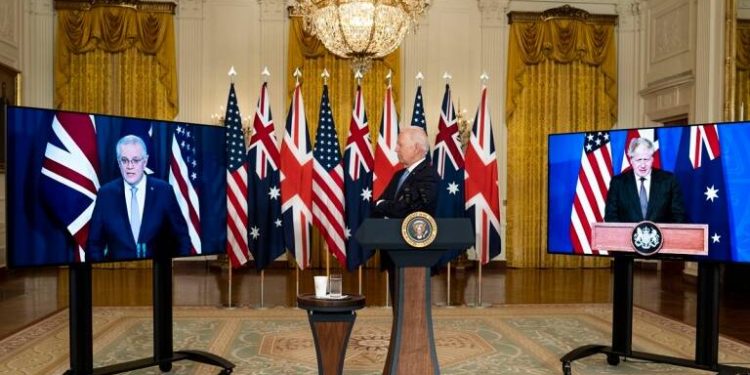A virtual diplomatic war has broken out between France on one hand and the AUKUS (Australia-UK-USA) combine on the other over the new alliance among the three latter countries September 16 and its fallout – a nuclear-powered submarine deal clinched between Australia and the USA. The alliance has been forged to checkmate China in the Indo-Pacific region giving far more power and confidence to the earlier Quad grouping comprising Australia, Japan, USA and India formed with the same intent to frustrate China’s maritime designs in the region. Seemingly, India and Japan have been kept out of the new arrangement which adds a new dimension to the united efforts to thwart China’s ambitions in the common sphere of activities. The initial reaction of China to the AUKUS was predictably belligerent and it issued an official statement terming the new grouping ‘irresponsible’ and an attempt to revive the ‘Cold War’ that would trigger an arms race threatening the stability of the region. This is only natural, since China will now have to confront nuclear-powered submarines and also a US nuclear power base in Australia. So long it has been pursuing its goal of controlling the Indo-Pacific region with its dominance over the South China Sea without any deterrence of the caliber of the AUKUS.
But when many countries of the region, including India, Japan and Australia, feeling threatened by China’s unchallenged aggression in the Indo-Pacific region, were joyous following the new development, France fired September 18 a diplomatic missile on AUKUS that may well sound like music to China’s ears. France has called the new alliance “a stab in the back.” It accused Australia and the USA of lying over a contract Australia had entered into with France to buy French conventional submarines worth Aus$50 billion (US$36.5 billion, 31 billion euros) when signed in 2016. This makes it clear that the AUKUS grouping too, like all modern military operations, implies plain simple big business deals.
France has warned a grave crisis is going to engulf its allies and the NATO as a whole. The sudden cancellation of the Australia-French submarine deal and the inking of the Australia-US new deal is a huge setback for French President Emmanuel Macron not only because of its impact on business and job loss for France, but also on the fate of his electoral battle as he is soon going to face the French voter for a second term in office. His immediate reaction has been the symbolic protest by way of recalling French ambassadors from Canberra and Washington. The diplomatic row has also queered the pitch for a post-Donald Trump rapprochement between France and the USA.
In fact, French Foreign Minister Jean-Yves Le Drian used the most undiplomatic language towards Australia, the United States and Britain to term the deal an outcome of “lying, duplicity, a major breach of trust and contempt.”
He simply brushed aside the Australian Prime Minister Scott Morrison’s plea that he had informed France beforehand about the new arrangement. The “information,” Le Drian insisted, was conveyed to France only an hour before the announcement was made about the formation of the alliance and the submarine deal with the USA. This, according to him, is very humiliating.
Le Drian described the withdrawal of the ambassadors for the first time in the history of relations with the countries as a “very symbolic” act that aimed “to show how unhappy we are and that there is a serious crisis between us.” He reserved his invectives for the UK describing its role as that of a rank “opportunist.” “We know their constant opportunism. So there is no need to bring our ambassador (from London) back,” Le Drian said.
Immediately thereafter the USA and Australia have gone about mollifying France, but the wounds are too deep to heal any time soon. Biden sought to underscore the dire necessity of extending American nuclear submarine technology to Australia and cyber-defence, applied artificial intelligence and undersea capabilities to counter the rise of China. A White House official expressed “regret” over the French envoy’s recall and exuded confidence that the USA would continue to be engaged with France in the coming days to resolve their differences.
To assuage France’s feeling of betrayal Australia has fielded its Finance Minister Simon Birmingham who iterated Australia doesn’t underestimate the importance of France as its ally in their ongoing engagement in the region.
The AUKUS alliance is also likely to have important implications for Southeast Asia and the role of the ASEAN. Obviously, some of the nations in South East Asia, concerned over China’s growing military power in the South China Sea, will be quietly supportive of the move, which will impose higher costs on any military adventurism by the Chinese.
However, mere strategic alliances are not enough to contain China which has deep economic ties with many countries in the region. Significantly enough, two days after the AUKUS was formed, China filed an application to join the Comprehensive and Progressive Agreement for Trans-Pacific Partnership which had been signed by 11 countries including Australia, Canada, Chile, Japan and New Zealand in 2018. The move evinces Beijing’s keenness to deepen its economic integration with the region so as to pull these nations to its orbit by sheer economic gravity.
The new alignment of AUKUS in the Indo-Pacific region has at least given a strong signal that the USA is not going to withdraw into a shell following its pullout from Afghanistan, leaving its allies and partners in Asia high and dry.






































